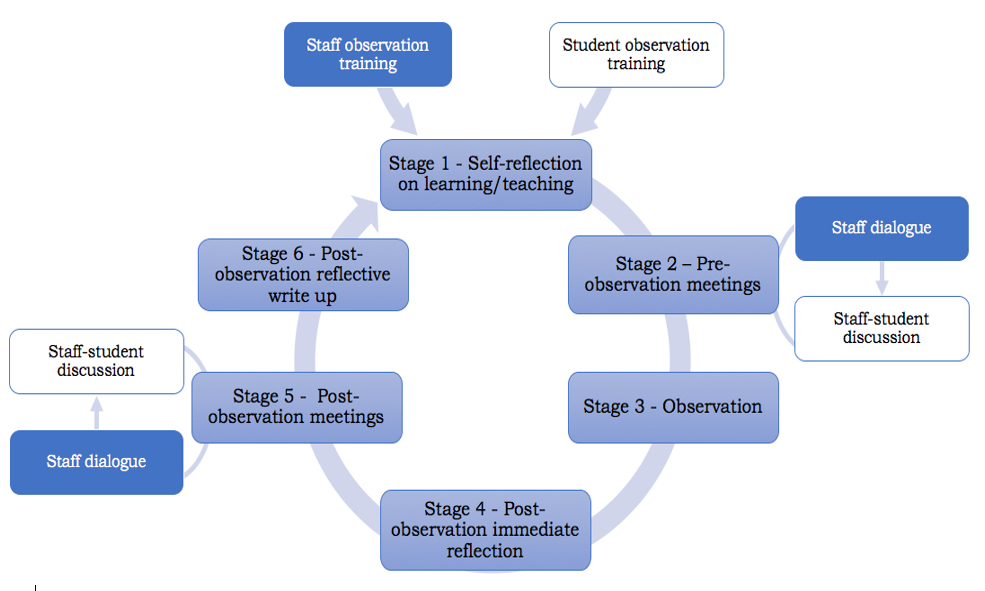15 January 2024
Belonging and building pedagogical relationships: Keys to enhancing learning and teaching quality

Author
Professor Matt O’Leary and Vanessa Cui, City University
Dr Jenni Jones and Julie Hughes, University of Wolverhampton
Dr Victoria Wright, Loughborough University
Central to a rich student learning experience is the idea that each student belongs and matters. The importance of belonging has featured as a longstanding criterion of student success in higher education. In the context of the interrelationship between teaching and learning, belonging offers us an important lens through which to explore the hot topic of student engagement and its role in shaping students’ learning experiences. One of the consequences of the COVID pandemic has been an ever-increasing focus on belonging and student engagement, particularly since the return of students and academic staff to campus and in-person teaching.
Our QAA Collaborative Enhancement Project, Enhancing learning and teaching quality through collaborative observation, explores student engagement at course level between students and staff.
By participating in two rounds of an innovative cycle of collaborative observation (CoCO), case studies of students and teaching staff from varied disciplines come together collectively to co-observe and co-reflect on the quality of their learning and teaching experiences and perceptions.
The diagram below presents an overview of the cycle and its various stages.

Our case studies include a wide range of subject areas from computer science to diagnostic radiotherapy, marketing and psychology, to name just a few of those that have participated in the eight case studies across the three universities to date.
This blog provides an insight into one of the common themes to surface from Cycle 1 of these collaborative observations.
One of the overarching themes to emerge from the case studies in Cycle 1 was the fundamental role that pedagogical relationship building plays in supporting the creation of meaningful learning and teaching experiences, along with developing a sense of belonging. This featured prominently in the pre-observation dialogue, post-observation and focus group discussions where the traditional power dynamic between students and staff was replaced by a more peer-based relationship. From a student perspective, being treated as ‘equals’ by their tutors and being made to feel that their voices were ‘being taken seriously’ and their views were ‘genuinely valued’, were repeatedly identified as some of the core ingredients in building effective pedagogical relationships. This raises interesting questions about student participation and representation in the context of student voice in higher education. In particular, how providers perceive the role of students in contributing to organisational data sets and the type of meaningful relationships they attempt to encourage by current approaches to student voice.
Many of our participating students talked about how their self-confidence had improved as a result of feeling trusted and empowered when interacting and collaborating with academic staff. Engaging in collaborative dialogue and pedagogical relationship building with their tutors enabled them to demystify some of the perceived hierarchical boundaries and power dynamics between the two. As one of the students commented:
‘My opinion about speaking to a lecturer and like how scary that is, and now I see it's really not. It's just a normal conversation.
Staff and students learnt that they can communicate well and work well together on teaching and learning collaboratively, treating each other as equals. The following comments from one of the staff participants in our project were particularly revealing about the way in which students are perceived by staff and the nature of the relationship between the two:
I think these sorts of projects blur the lines between who is a learner and who is an educator, and maybe we can be more than one at any one time. How should we be thinking of our student colleagues and our staff colleagues? If we only place the people who are staff as colleagues, I feel that we're missing out significantly on the experience in that learning setting and which to me the collaborative observation process should or hopefully starts to blur the lines between. Staff and students are all partners in this... it then starts to already reduce some of those barriers or power dynamics that exist between the teacher having everything and the students waiting to receive that knowledge.
From a staff perspective, engaging in ‘meaningful dialogic interaction’ with students through the group discussions included throughout CoCO was collectively identified as a ‘unique learning opportunity’ and ‘real evidence’ that they could use to inform and enhance their practice. In some cases, staff were able to apply the findings from their collaborative discussion immediately into their planning or teaching practice.
In this sense, the evidence generated in these dialogic interactions provided a live, instantaneous source of feedback that could be incorporated into enhancing the quality of the learning and teaching experience while the course was still ‘live’. As one of the staff participants commented when reflecting on her experience of Cycle 1:
Cycle one was a really positive and empowering experience … some really useful suggestions from the students’ perspective that can help me in my teaching practice.
These reflections tended to dovetail with other feedback points and were also naturally reflected and translated through the teacher’s own professional judgements. The staff participants from one case study commented that:
We don’t wholesale make a change on the basis of a few, but we do make a change on [the basis of] consideration of their unique perspectives alongside other feedback sources and with a confident and assured professional judgement.
Many staff participants talked about this being an authentic collaboration between them and their students, in contrast to the ‘disembodied feedback’ that they receive from module and/or end of course student evaluations, and peer observations. The value of this dialogic interaction is captured concisely in the account of a staff member from one of the case studies, and echoed by all the case study participants, when talking about the post-observation collaborative dialogue:
We have this post observation meeting where we have this opportunity to clarify the feedback. So we give the feedback. We also can give immediate response to the feedback. We can clarify what it means. We can discuss suitable actions from both perspectives. So we're working together to propose some action plans. So that's the elements that I really appreciate ... the element of collaboration between everybody involved.
Findings from Cycle 1 highlighted how the pedagogical relationships between staff and student participants and the environment they co-created were fundamental to the sharing, discussions and collaborative working amongst case study members. Repeatedly, participants talked about how valuable this partnership process had been for them to get to know each other as ‘real people’ and to help them to build confidence in their relationships going forward. The model of CoCO and its underpinning principles was identified as a key enabler in fostering this genuine collaboration, as one of the staff participants identified in her summary of the role that CoCO played:
I think to build that relationship with your student creates a whole different engagement in the classroom because it means that they understand the meaning behind it. It's not just a case of, you know, they're coming to me to get an assessment grade. They've got their own roles and they feel like part of that academic community as well.
In a similar vein, student participants talked about the way in which this collaboration had transformed not only their relationships with their lecturers but had resulted in a deeper understanding and appreciation of the work that goes into preparing for teaching:
I think it's quite exciting to work with your lecturer because I feel like when you go through like the school system and like college, it's sort of on two separate sides. So I think when you can work with the person who's teaching, I think not only this gives you more of an insight, but I also think ... when you are learning, you start to think ‘what planning went in this’, ‘what am I doing’, and you have more respect for your teachers.